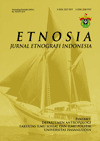Abstract
The existence of Indonesia women through media has been pioneered by R.A Kartini who is known for hes ability in voicing his opinions and thoughts into her writing ability through letters. These letters in the present transformed into social media that became the medium of self-actualization of women. This Article focuses on how women educators in Makassar activity in the Facebook and Whatsapp. The study indicates that there are two main reasons why Facebook and Whatsapp are the preferred informative social media in this research, both of which are the most popular (because they are mostly used by one’s networking) and practical social media (because people can be easily found and to be found through these two social media and because of the facilities of these social media, they can share (like photos, documents, videos, etc.), and interact in various forms (such as video call, online games, etc.). Facebook and Whatsapp are used to connect each other, as the source of information, as an online shopping venue, a place hobby channeling, as well as a space to share moments. Their activities on Facebook and Whatsapp can be classified into silent readers, commentators, broadcasters, promoters, and owners of the stage. In fact, social media users are inversely proportional to the ability to understand Facebook and Whatsapp as ‘private spaces’ rather than as ‘public spaces’ where content are shared openly.
References
Alimuddin, A.Batari; Sadjad, Riza S.; danMuhammad Najib. 2014. ‘Sikap dan Perilaku Remaja Perempuan Dalam Ajang Gaul Melalui Media Sosial Facebook’, Kareba,Oktober-Desember, 3(4): 218 – 225.
Bell, David. 2007. Cyber Culture Theorist, Manuel Castells and Donna Harraway. London dan New York: Rouledge.
Dahniar, Diandra S. 2013. Identitas Perempuan Dalam Sosial Media. Skripsi, Universitas Sebelas Maret, Surakarta.
Helpiastusti, Selfi B. 2016. Media Sosial dan Perempuan: Analisis Wacana Terhadap Facebook Sebagai Media Komunikasi Terkini Bagi Perempuan. Skripsi, Universitas Jember, Kabupaten Jember, Jawa Timur.
Maryani, Eni dan Arifin, Hadi S. 2012. ‘Konstruksi Identitas Melalui Media Sosial’, Journal of Communication Studies, 1(1):1-12.
Nasrullah, Rulli. 2015. Teori dan Riset Media Siber (Cyber Media). Jakarta: Kencana.
Nugroho, Septiaji Eko. 2018. ‘An Introduction to MAFINDO’, Seminar Pendidikan Nasional dan Talkshow Technology For Education and Education For Technology, Teknologi Pendidikan Universitas Negeri, Makassar, 21 April 2018.
Wahyudianto, Dennis. 2011 Media SosialSebagaiSaranaAktualisasiDiriPerempuan, https://www.academia.edu/10699406/diakses tanggal 5 Januari 2018.
https://id.techinasia.com/comscore-whatsapp-adalah-aplikasi-terpopuler-di-indonesia, diaksestanggal 19 Februari 2018.
http://lintasterkini.com/21/07/2017/dilapor-polisi-dosen-uin-mengadu-ke-kpjkb.html, diakses tanggal 19 Februari 2018.
https://news.detik.com/berita/d-3654503/muncul-situs-lelang-perawan-kawin-kontrak-menteri-yohana-mengecam. Diaksestanggal 11 Desember 2017
www.profesi-unm.com/.../viral-tiga-mahasiswi-unm-bikin-video, diakses tanggal 01 Juni 2018
https://student.cnnindonesia.com/edukasi/20170910122629-445-240706/mengapa-literasi-di-indonesia-sangat-terendah/diakses tanggal 10 Februari 2018.
https://www.viva.co.id/berita/metro/916440-ip-penyebar-foto-tanpa-busana-firza-husein-anonymous, diaksestanggal 11 Desember 2017.
https://tekno.kompas.com/read/2018/03/02/08181617/indonesia-pengguna-facebook-terbanyak-ke-4-di-dunia, diaksestanggal 19 Februari 2018.





